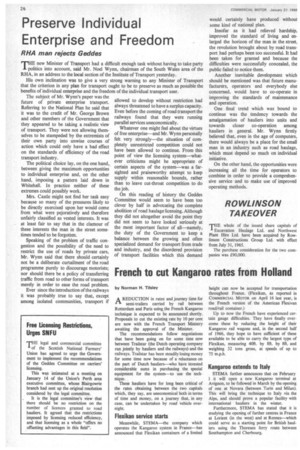Preserve Individual Enterprise and Freedom
Page 28

If you've noticed an error in this article please click here to report it so we can fix it.
RHA man rejects Geddes
1E new Minister of Transport had a difficult enough task without having to take party politics into account, said Mr. Noel Wynn, chairman of the South Wales area of the RHA, in an address to the local section of the Institute of Transport yesterday.
His own inclination was to give a very strong warning to any Minister of Transport that the criterion in any plan for transport ought to be to preserve as much as possible the benefits of individual enterprise and the freedom of the individual transport user.
The subject of Mr. Wynn's paper was the future of private enterprise transport. Referring to the National Plan he said that it was to the credit of Mr. George Brown and other members of the Government that they appeared to be taking a realistic view of transport. They were not allowing themselves to be stampeded by the extremists of their own party into unwise courses of action which could only have a bad effect on the standards of efficiency of the road transport industry. The political choice lay, on the one hand,. between giving the maximum opportunities to individual enterprise and, on the other hand, imposing a pattern laid down in Whitehall. In practice neither of these extremes could possibly work.
Mrs. Castle might not find her task easy because so many of the pressures likely to be directly exercised upon her would come from what were pejoratively and therefore unfairly classified as vested interests. It was at least fair to say that in the clamour of these interests the man in the street sometimes tended to be forgotten. Speaking of the problem of traffic congestion and the possibility of the need to restrict the use of roads by private cars, Mr. Wynn said that there should certainly not be a deliberate curtailment of the road programme purely to discourage motorists; nor should there be a policy of transferring traffic from road to other forms of transport merely in order to ease the road problem.
Ever since the introduction of the railways it was probably true to say that, except among isolated communities, transport if allowed to develop without restriction had always threatened to have a surplus capacity. Even before the coming of road transport the railways found that they were running parallel services uneconomically. Whatever one might feel about the virtues of free enterprise—and Mr. Wynn personally felt very strongly—the situation of completely unrestricted competition could not have been allowed to continue. From this point of view the licensing system—whatever criticisms might be appropriate of certain aspects of the system—was a farsighted and praiseworthy attempt to keep supply within reasonable bounds, rather than to leave cut-throat competition to do the job.
On this reading of history the Geddes Committee would seem to have been too clever by half in advocating the complete abolition of road haulage licensing. Although they did not altogether avoid the point they did not seem to have looked seriously at the most important factor of all—namely, the duty of the Government to keep a balance between the growing and often Specialized demand for transport from trade and industry, and the disordered provision of transport facilities which this demand would certainly have produced without some kind of national plan.
Insofar as it had relieved hardship, improved the standard of living and enlarged the horizon of the man in the street, the revolution brought about by road transport had perhaps been too successful. It had been taken for granted and because the difficulties were successfully concealed, the public failed to notice them.
Another inevitable development which should be mentioned was that future manufacturers, operators and everybody else concerned, would have to co-operate in improving the standards of maintenance and operation.
One final trend which was bound to continue was the tendency towards the amalgamation of haulier's into units and towards closer co-operation among hauliers in general. Mr. Wynn firmly believed that, even in the age of computers, there would always be a place for the small man in an industry such as road haulage, which must depend so much on individual initiative.
On the other hand, the opportunities were increasing all the time for operators to combine in order to provide a comprehensive service and to make use of improved operating Methods.




















































































































